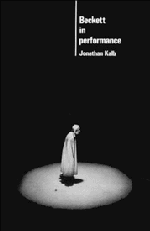Book contents
3 - Considerations of acting in the early plays
Published online by Cambridge University Press: 01 June 2011
Summary
In 1957, Alain Robbe-Grillet wrote about Didi and Gogo:
The dramatic character, in most cases, merely plays a role, like the people around us who evade their own existence. In Beckett's play, on the contrary, everything happens as if the two tramps were on stage without having a role.
They are there; they must explain themselves. But they do not seem to have a text prepared beforehand and scrupulously learned by heart, to support them. They must invent. They are free.
This comment was made about the characters, but it has been frequently applied to the actor's challenge, the aspect of early Beckett involving “pure performance,” which has continued to attract some of the world's greatest clowns. If a typical character actor works predominantly through intensive study of the script, in search of his personal history, a typical clown loves nothing better than dramatic freedom, the opportunity to hold an audience with nothing but a few props and his trusted charisma, on an empty stage.
Consider his dilemma, however, once he is cast in this play whose dialogue at first seems so much like Laurel and Hardy's. He must perform in a serious plot that both blocks unequivocal understanding of its serious meanings and undercuts the humor of his slapstick. He is under a continual obligation to create with the same sense of excitement and hope for spontaneous applause he would carry onto a music hall stage, except that he is not on such a stage, and is performing in a play that continually disappoints those expectations.
- Type
- Chapter
- Information
- Beckett in Performance , pp. 24 - 47Publisher: Cambridge University PressPrint publication year: 1989



